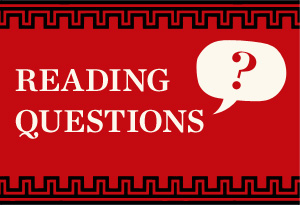Final Thoughts: Reading Question for A Tale of Two Cities by Charles Dickens
Spoiler alert: Questions may contain spoilers

12. Dickens prefaces the final paragraphs of the novel, which are in Carton's voice, by noting that "if he had given any utterance to his [thoughts], and they were prophetic, they would have been these" (page 371). How might we read the vision expressed in these words? Are we meant to take these thoughts as prophetic—that is, as a portrayal of what actually came after the end of the novel, in both France and in England? Among the beloved friends he has left behind?
Share your thoughts below!
Go to the next question
Get the complete list of reading questions
Share your thoughts below!
Go to the next question
Get the complete list of reading questions
Penguin Books and Penguin Classics wish to thank and credit the following writers and books for information used in creating this Reading Group Guide:
Janice Carlisle (editor), Charles Dickens, Great Expectations: Case Studies in Contemporary Criticism, New York, Bedford Books of St. Martin's Press, 1996
Edmond Jabes, The Book of Questions (Volume 1), Middletown, CT., Wesleyan University Press, 1976
Fred Kaplan, Dickens: A Biography, New York, William Morrow & Co., Inc., 1988
Norman Page, A Dickens Chronology, Boston, MA., G.K. Hall & Co., 1988
Janice Carlisle (editor), Charles Dickens, Great Expectations: Case Studies in Contemporary Criticism, New York, Bedford Books of St. Martin's Press, 1996
Edmond Jabes, The Book of Questions (Volume 1), Middletown, CT., Wesleyan University Press, 1976
Fred Kaplan, Dickens: A Biography, New York, William Morrow & Co., Inc., 1988
Norman Page, A Dickens Chronology, Boston, MA., G.K. Hall & Co., 1988



